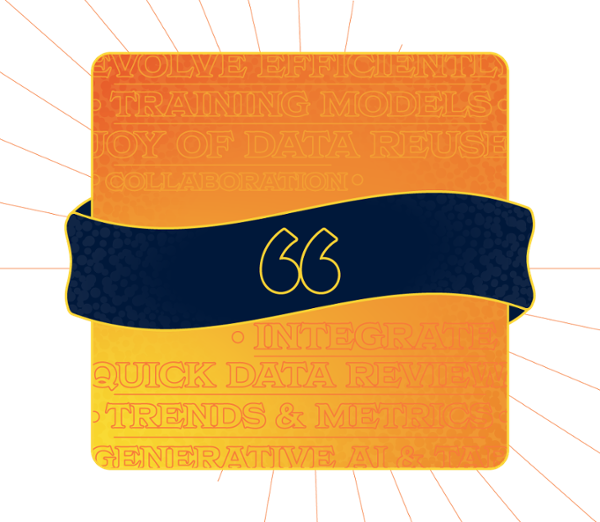If you’ll allow me to turn the clock back a few years, one of the first times I visited New York was for Legalweek 2020. At the time, we had only heard whispers about a vague phantom virus across the Pacific. And at the time, RelativityOne still felt new. My day consisted of long hours at Relativity’s booth somewhere in the Hilton, and we were talking to people about early advancements on our journey into the cloud.
Fast forward to now, and seeing RelativityOne during Legalweek 2024 felt like seeing a baby all grown up compared to back then.
Not only has RelativityOne grown robustly as our flagship offering, but the entire industry has turned on its toes numerous times. Since 2020, technology across the industry has been bought and sold. Companies have been merged. Brand new organizations have been raised who readily compete with industry “heavyweights.” And tiny monoliths of thought—like the prospect of technology predicting the next word in a sentence—have captivated us, moving us to envision new borders between person and machine.
I’m reminded of Lin-Manuel Miranda’s Hamilton—specifically, the Broadway show’s final number:
Let me tell you what I wish I'd known
When I was young and dreamed of glory
You have no control
Who lives, who dies, who tells your story
But the best part is seeing this story of growth and advancement through the eyes of our community, so we’re sharing some Legalweek insights from our network of partners. Of course, this is not a complete list of the organizations connected to Relativity; nor is it a complete list of topics, predictions, solutions, workflows, news, roadmaps, or anything of that nature.
This is a peek, through the Relativity lens, at partner stories we gathered during Legalweek 2024.
Many of our partners presented at the conference, including Ricoh North America:
Today at Legalweek, along with my colleague, Seth Mcgaw, Director of Client Services at Ricoh in the United States for e-discovery, Gretel Best, Manager for Litigation Support Services with Gowling WLG in Canada, and Jake Ancona, who is Senior Legal Counsel for Fidelity National Investments in the U.S., we presented on the evolution of the e-discovery ecosystem in North America. The ecosystem is the interplay between external counsel, internal counsel, vendors and, by extension, technology related to performing e-discovery and related services. The discussion was about how we can better integrate together, how we can work together in the new framework we have around generative AI and other tools that are developing in the market, as well as figuring out ways that counsel—internal and external—and vendors can solve problems that each other has.
It isn’t a one-way street. It’s not vendors going to clients and saying, “what can we do for you?” It’s also clients coming and saying, “I have this problem. You might have experience with it. How do we solve it together?” And our point is that the entire process, the ecosystem, needs to be as collaborative as possible so that it can evolve efficiently and effectively and ensures that we get the best results at the end of the day.
– Sean Lynch, Director, Client Solutions, Ricoh North America, via LinkedIn
Like Relativity, numerous partners spent a lot of time on the conference show floor talking to attendees:
What we’re really excited about is our release and continuous evolvement around RelativityOne Insights Dashboard via Epiq Access. This allows people to manage their business with trends and metrics. It empowers them to make business decisions.
– Scott Berger, SVP eDiscovery Managed Services, Epiq via LinkedIn
We also have a TAR dashboard which shows the footprint, or the analytics, that we are tracking across matters. We can do that on an individual project basis or across portfolios. This enables clients to track cost savings, data footprints, and trends across projects.
– Mandy Pierre-Blanks, Senior Director, Client Services, Epiq, via LinkedIn
MEDAL Relay is important to the market because mobile devices are becoming the center of people’s lives. Everybody’s doing all their work away from their computers. Their whole life is in their phones—no longer in their computers. So that becomes important when you start talking about litigation, investigations, and cases. You’ve got to be able to get to that data much faster than in the past because cases move quickly and investigations even quicker.
You’ve got to figure things out. You’ve got to know what’s going on. And MEDAL Relay allows us to bypass the export, the processing, all the extra steps and push [data] directly into Relativity. It goes right into Relativity Processing, loads into the case, and you’re able to now review that mobile data as early as the same day.
– John Wilson, CISO & President of Forensics, HaystackID, via LinkedIn
Here at Lineal, we take our partnership with Relativity very seriously. What we really want to do is give our customers an experience on top of Relativity that they can’t get anywhere else.
What we’re working on, and very excited about—because it just rolled out today—are two products: Command Center and Memory Bank. Command Center is a one-stop-shop to look at all your data information, and also your cost and production information. And the Memory Bank is a way to actually make decisions and reuse them matter to matter.
So, the thing that we’ve been talking about for longer than I’ve been practicing—for the joy of data reuse and the efficiency of it—we are building and about to roll out for our customers. I couldn’t be happier.
– Jeanne Somma, Chief Client Officer & General Counsel, Lineal, via LinkedIn
Many partners had exciting, primary information to share during the week, like FTI’s long-running research collaboration with Relativity, the General Counsel Report:
In Part 2 of the General Counsel Report, you’re going to see a much bigger emphasis on technology and developing technical acuity than we’ve seen in previous years, and a comfort level in the use of generative AI.
– Wendy King, Senior Managing Director, FTI Consulting, via LinkedIn
And of the topic du jour, our precocious Hamilton fit for reification, everyone talked about generative AI:
At the beginning of 2023 we thought it was going be a fine-tuning: that we were going to be training models on documents and then we’d be asking questions of those models. It quickly became clear that as context windows expanded, as things like GPT-4 Turbo and Claude 2 came out that we were going to be able to handle much, much larger documents just as queries—we weren’t going to have to hassle with fine tuning, model training and things like that. It really just changed the game entirely towards the second half of 2023 and now we’re seeing most of the products that are hitting the market aren’t even using any kind of fine tuning or training at all: they are using pre-trained models—frequently stock, off-the-shelf models, to analyze documents, answer questions, to bring back data, and to support a lot of the operations that vendors in our space were already doing—and just doing them better.
– John Brewer, Chief Artificial Intelligence Officer, HaystackID, via LinkedIn
We’ve seen irresponsible uses of [AI] in the news—which is always fun to read but certainly not what we want to extend out through our service offerings in Relativity to our clients. What we’re really discussing and understanding is what our clients think they can get out of it, explaining how we think generative AI can be used, and explaining other aspects of AI—very specifically TAR.
What we’re attempting to do is make a little bit of an analogy, that AI can really be the snowplow, and that we and our people with eyes-on can be the shovel. We can move a lot of snow with big objects and then we can come in, clean things up, QC things, and look at real positive use cases as to how we can get the largest bang for our buck out of applying different aspects of AI—not just generative AI.
– Marc Zamsky, CEO, Cimplifi, via LinkedIn
Special thanks to Steve Tanner and the social media team at Relativity who captured these moments with our Relativity partners.
And shout-out to the entire community for having big conversations, supporting one another, and pushing for more innovation, more growth, and more positive change this year—and well into the future.
Graphics for this article were created by Sarah Vachlon.












